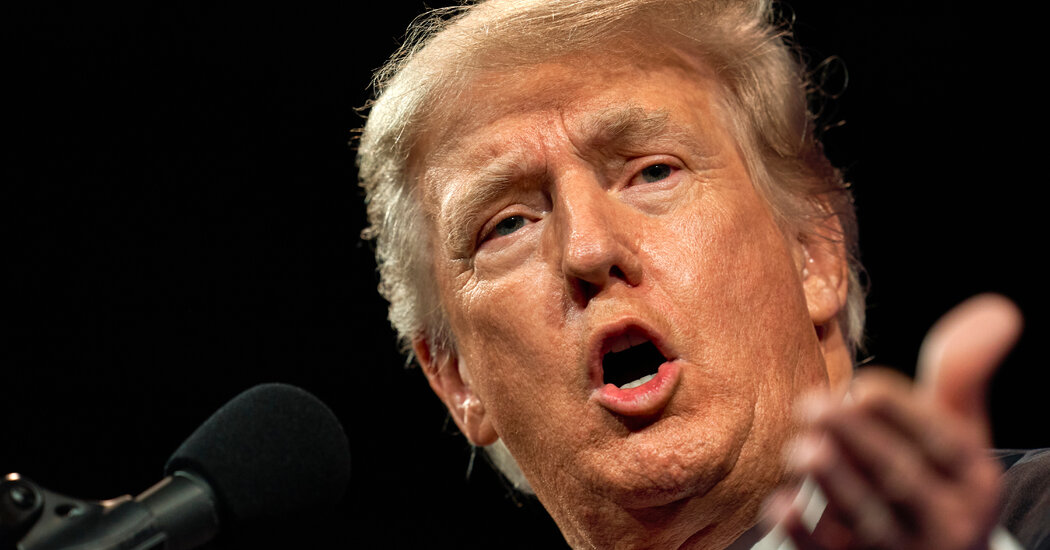A court filing by a defendant in a Capitol riot case said the Justice Department was looking for information about a possible “organized conspiracy” involving the former president.
For months, the Justice Department has provided little public indication of whether, or how seriously, it is investigating the role played by former President Donald J. Trump in the violent attack on the Capitol last Jan. 6.
But on Tuesday, for the first time, evidence emerged in court papers that prosecutors have posed questions to at least one Jan. 6 defendant that were “focused on establishing an organized conspiracy” involving Mr. Trump and his allies to “disrupt” the work of Congress.
The papers were filed by a defense lawyer in the case of Brandon Straka, a former hair stylist who founded a group called the Walk Away Foundation, which seeks to persuade Democratic voters to leave the party.
On the day before the Capitol was stormed, Mr. Straka spoke at a pro-Trump rally in Washington with prominent right-wing figures like the conspiracy theorist Alex Jones. Mr. Straka was also at the Capitol on Jan. 6.
In October, he pleaded guilty to charges of disorderly conduct, admitting, among other things, that he had urged a crowd outside the building to wrest a riot shield away from a police officer.
Last week, prosecutors filed a sentencing memo in his case, recommending that he serve four months of home detention. The memo noted that Mr. Straka had met with prosecutors earlier this month as part of his plea agreement and had been “cooperative” in answering their questions.
It remains unclear exactly what those questions were, but Mr. Straka’s lawyer, Bilal Essayli, offered a broad description in his client’s own sentencing memo, which was filed on Tuesday. In the memo, Mr. Essayli said that during Mr. Straka’s interview with prosecutors, “the government was focused on establishing an organized conspiracy between defendant, President Donald J. Trump, and allies of the former president to disrupt the joint session of Congress on Jan. 6.”
Mr. Straka “answered all questions truthfully and denied the existence of any such plot,” Mr. Essayli’s memo said.
Mr. Essayli did not respond to phone calls seeking comment about the interview. William Miller, a spokesman for the U.S. attorney’s office in Washington, which is prosecuting the cases related to Jan. 6, also declined to comment.
In the past year, prosecutors have charged more than 700 people in connection with the storming of the Capitol, including members of far-right extremist groups like the Oath Keepers militia, whose leader was accused of sedition last week with 10 of his subordinates.
Key Figures in the Jan. 6 Inquiry
The House investigation. A select committee is scrutinizing the causes of the Jan. 6 riot at the U.S. Capitol, which occurred as Congress met to formalize Joe Biden’s election victory amid various efforts to overturn the results. Here are some key figures in the inquiry:
Still, there has been enormous public interest in whether investigators will ultimately reach beyond those who took part in the melee on Jan. 6 and seek to build a case against Mr. Trump and the circle of his allies who helped inspire the violence that day with baseless claims of election fraud.
On the first anniversary of the attack, Attorney General Merrick B. Garland said he was committed “to holding all Jan. 6 perpetrators, at any level, accountable under law.” But he did not name Mr. Trump, and there has been little public indication of any effort by the department to seek information from or about any of his close aides or allies.
The description of the interviews in Mr. Straka’s memo, however brief, echoed comments made by some members of the House select committee investigating the events of Jan. 6, who have questioned whether Mr. Trump broke the law by obstructing Congress’s duty to oversee the peaceful transition of power to Joseph R. Biden Jr.
Representative Liz Cheney, Republican of Wyoming, the vice chairwoman of the House committee, has been particularly pointed in suggesting that Mr. Trump, by failing to stop the violence at the Capitol on Jan. 6, may have violated federal law. The law Ms. Cheney was referring to — obstruction of an official proceeding before Congress — has been challenged repeatedly by defense lawyers with Jan. 6 cases, but five separate federal judges have recently ruled that it was viable.


























